
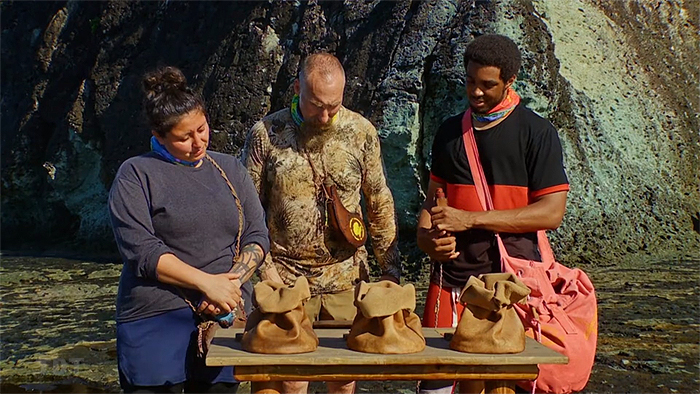
Survivor 43 has kicked off with two oversized episodes, with a 2-hour premiere and a 90-minute episode the following week. It's as if international Survivor has taken over US Survivor!
Well, sort of. So far it's been more SurvivorAU than SurvivorSA, with a mostly brute-strength Ep2 RC/IC, and the purpling of Nneka and Cassidy and Lindsay, in favor of confessionals galore by the men (except James, also now purple). But still, the extra airtime has allowed us to get to know most of the contestants fairly well, some of whom are even women.
Oh well, you can't expect a Survivor franchise to be perfect on its 43rd try. Also, there are still 11 episodes to go, which is more than enough time for this season to balance out, especially once we hit the merge and the individual gameplay begins. More on that in a bit.
The give and take of the post-42 twist tweaks
For an allegedly all-new cycle of gameplay that bills itself as "unpredictable," Survivor 43 has thus far shown a striking resemblance to its two immediate predecessors. The show did generate some long-awaited fan goodwill when it announced two big structural changes: the removal of the most loathsome 41/42 twists: the hourglass ("Turn back time") and the nonsensical "Do or Die." That's good! At least until we learn what atrocity has replaced them.
Production has also made some minor adjustments to the other time-filling endeavors added to the post-Winners at War game. Some of these are welcome, others feel like a step back. To the extent we've seen the full repertoire of changes, the results are mixed, but on balance the newer new era is at least leaning in the positive direction. (Do or Die was that bad.)
Even with these changes, though, this season has thus far had a very familiar, predictable feeling. It's playing out more like a third back-to-back (-to-back) season in the 41/42 filming cycle than one that breaks new ground. Which sort of puts to rest the show's contention that it couldn't possibly make adjustments to the format between 41 and 42, because, gosh, there just wasn't time. Rather, they obviously just thought everything was great, and didn't want to change anything.
Just 12 months ago, the show was trumpeting its then-brand-new twist orgy as a "monster" for the contestants to overcome. So far, that monster feels like it's asleep or on cruise control. Which, on balance, may not be all bad. It keeps the focus mostly on the contestants, where it should be.
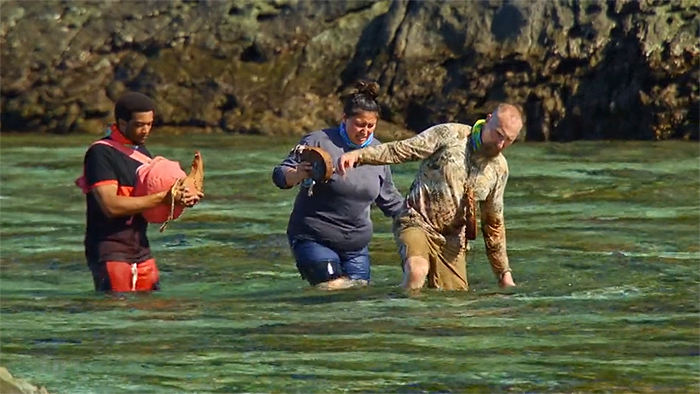
Dilemma rock, ahoy: How has this season played out predictably so far? Well, there was a Day 2 dilemma, in which boats pulled up to each camp and whisked one tribemate away. This was, of course, exactly the same timing and setup as in 41 and 42. Despite that, the show still comfortable enough to trot out Lindsay, claiming: "Coming out here, I thought about this exact scenario, but I have no idea what's about to happen." Uh huh. You can fool Probst with that line, Lindsay, but nobody else is buying it.
To be fair, a slightly different dilemma than the 41/42 shipwheel awaited Karla, Gabler, and Dwight in the premiere. Gone is the shipwheel itself, replaced by "risk" and "no risk" cards betrween which the contestants must choose, then reveal to each other simultaneously. This changes one major aspect of the dilemma: Everyone in attendance (and everyone they tell back at camp) immediately knows who risked, and who didn't.
For Karla, who didn't risk her vote, that's a big plus. She doesn't incur an early reputation with the other two tribes as an aggressive, balls-to-the-wall gambler. She's more likely to be seen as a pawn and/or be underestimated at a swap or the merge. To be seen as a predictable, reliable player. These are good things, since she does not seem like that kind of player at all. (She does miss out on one important piece of information, though: Which of the two risk-takers received the idol, since that is revealed back at each attendee's camp.)
In contrast, Dwight and Gabler — the two who did risk their votes — will henceforth be viewed as potential Big Move-rs. One big change: In this case where only two people risked their votes, each of their fates in the draw is 100% known to the other, long before they attend Tribal. And since each told their tribemates, everyone on Vesi knows that Gabler has an idol over at Baka camp.
As damnbueno pointed out (in the comments), that's a huge step backward from the intrigue and tension the last two seasons, where people who chose to risk their votes did not learn the results of their dilemma decision until the very last minute, when they entered the voting booth at Tribal.
That meant Omar hit the merge not knowing whether he had a vote or not, and only figured it out after hearing about the messy Vati Tribal where Chanelle (and Mike) couldn't vote. Even if Omar had told his tribe about risking his vote prior to the merge (did he? I don't recall), none of them knew what Chanelle's choice was. That mystery is no longer a factor in the game, which is a bit of a loss, entertainment-wise.
Another downside is that in the 41/42 version, if two people risked their votes while a third didn't, BOTH of the two risk-takers were rewarded. Here, that's been replaced with a game of chance, and only one of the two can win. It's "Do or Die," just in smaller, lower-stakes packaging. It's fine, but it makes the risk-taking much less enticing. Conversely, in the marginal case where everyone elects to risk, one of the three now receives a prize, instead of all three losing their respective votes. Again, these changes both give and take.
These adjustments do make it simpler for the contestants to play the game, however, and give everyone plenty of time to plan around the missing votes (as we saw this week). But they also make the dilemma-based advantages a lot more public. True, that was probably always going to happen, since everyone had seen Survivor 41 (and part of 42). Every player (even Lindsay) knew the dilemma visitors were receiving a chance to gain some kind of advantage. So it was highly unlikely the Episode 1 three could have returned to camp without telling their tribemates what happened, and the more documentation they could show to back up their stories, the better.
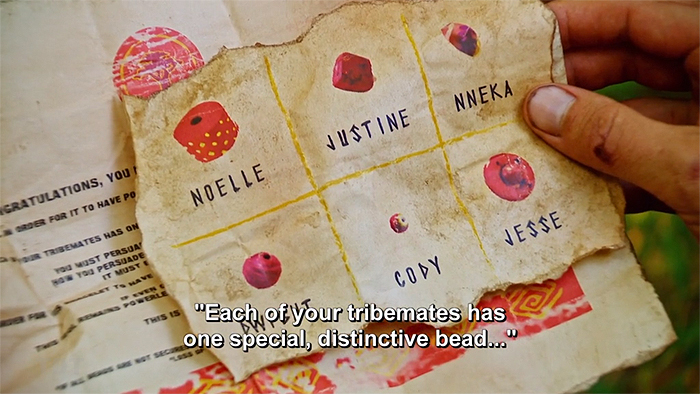
Idol chatter: The other major twist change, in the Beware idols, moves the secrecy/strategy calculations in the opposite direction. Whereas in 41 and 42, every Beware idol holder immediately knew who else had an idol from their having to publicly say the phrases to unlock them, the new Beware "bracelet" idol (above) can theoretically be activated without anyone but the holder knowing. Assuming, of course, the other tribes' idols use the same unlocking mechanism as Cody's one at Vesi did.
Not only that, but in a welcome change, these Beware idols can be activated at any time. In 41 or 42, anyone finding a Beware idol in the time between their tribe losing an immunity challenge and Tribal Council would immediately lose their vote at that Tribal, and had no possible way to regain it until the next episode's IC, at the earliest. Having the risk (and benefit) of these idols be entirely self-contained within one tribe is a much better system for the players.
In this case, the idol didn't stay private for long. Cody reached out to his allies (Jesse and Nneka) for assistance in re-activating his vote, and the bead-collecting exercise sort of tested his social abilities (less so than the note claimed). At least for this first time through, this was an amusing diversion. Lord help us if we're all still having to watch people try to collect beads in Episode 5 of Survivor 44, but at least this once — especially when there was apparently a ton of extra time to fill in a surprise 90-minute episode — it was fun. Even small changes can have a big effect.
The biggest and most important change from 42, of course, is the contestants themselves. No complaints on that front. Casting has assembled another set of different, interesting people, most of whom know the game. Plus a few wildcards with big entertainment value, like Cody. If Malcolm was a time-traveling Jimmy T, could Cody be a time-traveling Keith Nale?
Has "keeping the tribe strong" finally become a good idea?
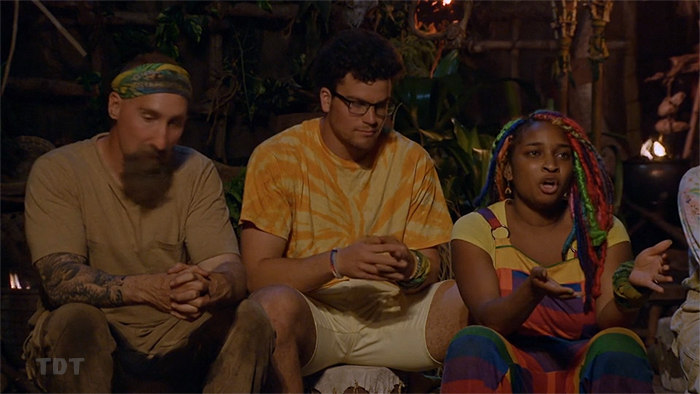
It's the phrase you love to hate, the mantra of every bemuscled ex-jock in Survivor history, the excuse most frequently floated for voting out your favorite older woman or superfan in the pre-merge: "We have to keep the tribe strong." It's an approach of which Jeff Probst has always been in favor, as it favors alpha males. But has the host finally altered the game enough that it's actually true?
Maybe. We're still early on in the always-three-tribes "new era" of Survivor, but there are starting to be enough data points where it might be meaningful. (Still short of the 95% confidence interval ... but perilously close.)
How did we get here? Well ... back in the olden days, back-to-back seasons (Tocantins and Samoa) demonstrated the utility of a starting tribe actually losing in the pre-merge, whittling down one of the two initial tribes to a tight core, then flipping the tables in the post-merge on the other tribe, the one with less voting experience.
A few years later, the first modern three-tribe season (Philippines) extended that concept, even generating a named strategy, the "intentional Matsing." But as we've had more and more iterations of three starting tribes, the data is starting to argue that the opposite may actually be true: Go to Tribal as little as possible in the pre-merge.
Here are those numbers (below). To evaluate whether it's better or worse to attend Tribal pre-merge, we counted the number of Tribal Councils attended by each person who made the merge, and separated them into two groups: those left in the game after the final vote-out ("finalists", which includes the F4 fire-makers in S35 and beyond), and the jurors who were voted out (so one less than the total jurors for S35 on ... also not counting Dan Spilo, because fuck that):
| # of finalist pre-merge Tribals | # of juror pre-merge Tribals | ||||||
|---|---|---|---|---|---|---|---|
| Season | F1 | F2 | F3 | F4 | Finalist mean | # jurors | Juror mean |
| S8 | 2 | 1 | -- | -- | 1.5 | 7 | 2.4 |
| S25 | 6 | 0 | 0 | -- | 2.0 | 8 | 1.3 |
| S28 |
1 |
1 |
-- |
-- |
1.0 |
9 |
2.4 |
| S30 | 2 | 2 | 3 | -- | 2.3 | 8 | 2.4 |
| S32 | 0 | 3 | 2 | -- | 1.7 | 8 | 2.0 |
| S35 | 1 | 3 | 4 | 3 | 2.8 | 7 | 1.3 |
| S39 | 2 | 5 | 3 | 2 | 3.0 | 9 | 3.7 |
| S41 | 0 | 0 | 2 | 0 | 0.5 | 7 | 2.0 |
| S42 | 1 | 2 | 2 | 1 | 1.5 | 7 | 1.7 |
What does this all mean? In every season (except Philippines, where Denise is an all-time extreme outlier in having attended EVERY Tribal Council that season, and HvHvH which is an outlier for other reasons), the people never voted out attended fewer Tribals, on average, than the other people voted out after the merge.
Not only that, but (again with the exception of Philippines, and also All-Stars, which is far from a modern season) the winner of the season (F1) was the finalist with the fewest Tribals attended pre-merge. (Tied for the fewest in several seasons, but still.)
The average number of pre-merge Tribals for all "finalists" is 1.86 ± 0.28 (mean ± SEM). The average for jurors is 2.17 ± 0.16. That's not statistically significant, but it's close, and the two numbers are diverging more in the "new era" (1.0 vs. 1.85). This argues, especially now, that it's better to avoid Tribal in the pre-merge. And with only five pre-merge votes in each of the past two seasons, that's becoming increasingly easier to pull off.
There are, of course, notable exceptions. In both Philippines and HvHvH, there was a tribe that never attended Tribal pre-merge, and those tribes of six were targeted post-merge. (That didn't happen in 41, though.) Despite that inclination, though, it's still better on average not to attend Tribal pre-merge in a season that starts with three tribes of six. Although, to be fair, it's also possible this is too small a sample size, and this will all even out over the next couple of seasons.
Even if the overall concept of avoiding Tribal may be correct, though, the execution of that idea is where recent seasons have fallen into trouble. "Strong" doesn't usually mean physically strong. Having a good balance of strength, agility, swimming, and puzzle-solving skills is the best approach, but tribes almost never think that way when deciding who's "strong."
Just this season, Morriah performed the best for Baka in the Ep1 IC, and was voted out, despite failures by Jeanine, Gabler, and Sami in critical roles. Then, as we learned this episode, Gabler was also struggling physically at the time. (So far, no negative consequences for that decision, obviously.)
A new type of superfan?
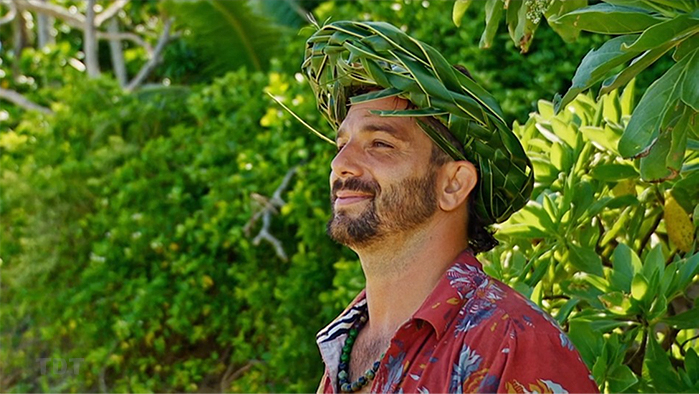
One fun new development in this cast is a new kind of "super" fan. In the past we've had long-time viewers who have applied every time that it was possible to do so. We've had people who learned English from watching the show. We've had copious numbers of people who grew up watching the show with their family, and are now competing in their teens/twenties. We've even had several contestants younger than the show itself. After 42 seasons, what more could possibly be different?
In a word: Streaming. Four seasons of Survivor have been on Netflix (albeit two at a time). Amazon Prime has most of them. Paramount+ has all of them. (And used to have SurvivorAU, SurvivorSA, and SurvivorNZ, too ... for about a month before yanking them all away, probably because SurvivorSA had the audacity to outshine several US seasons.)
In one of Cody's first confessionals, he talked about discovering Survivor during COVID quarantine, watching multiple old seasons, and realizing he had the tools to not only play, but also win. The jury is still out on whether or not that's actually true, but it's great to see this kind of enthusiasm popping up in audiences that didn't necessarily get their Survivor fix once a week, every Wednesday (or Thursday) at 8 p.m. Eastern/Pacific.
It's a helpful reminder that there's no one "right" way to be a Survivor fan, and any new mechanism that helps expand the audience and pool of potential contestants is a good thing. More people wanting to play means more interesting people wanting to play.
The state of the game
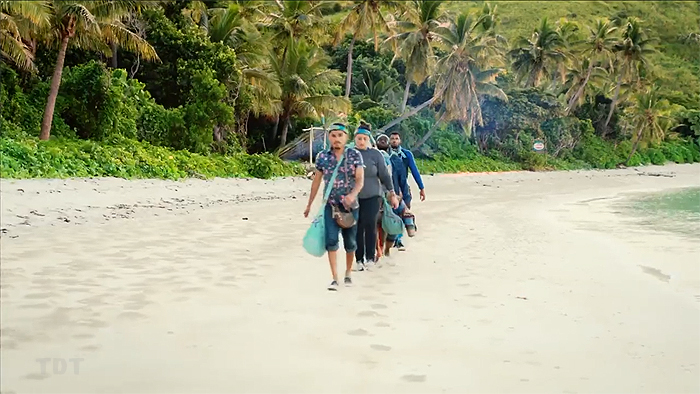
Three-and-a-half hours and votes by two different tribes really helped flesh out a lot of the contestants. Coco, the one tribe that hasn't voted, is still a bit of a question mark, but they'll be heading to Tribal soon enough (as the CBS fall preview teaser ad showed, above ... unless that's them heading to the merge). We're only five days in, but that's already 20% of the game's runtime. With that in mind, here is the state of the three tribes.
Baka
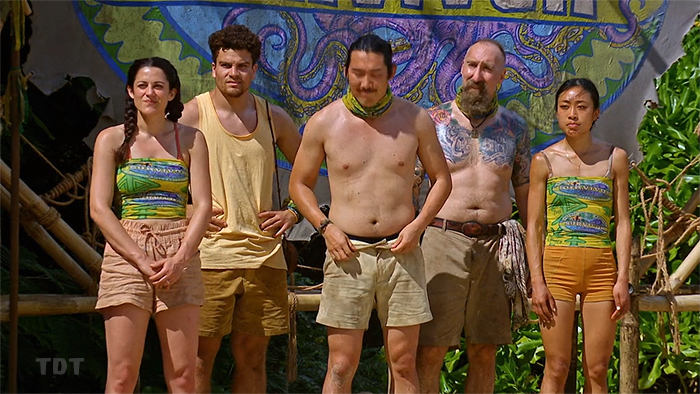
In the Ep2 RC/IC, Owen was the stealth MVP for this tribe: He was the fastest to swim to the cage, was the person overseeing getting the snake out of the cage, took the lead in hauling it on the beach, then had the foresight to cover up Baka's combination after they opened their lock (first), so the other two tribes couldn't copy it. Elie and Jeanine then built on the lead they had been handed, and delivered the victory with competent puzzle solving.
Owen has come a long way since his apology/gratitude segment at the top of the episode, after narrowly avoiding being the Ep.1 boot. In fact, if he didn't have an idol, Gabler may have taken the lead as the most likely next person out from that tribe, given his physical maladies. It'll suck if the "men's alliance" that was haphazardly mumbled into existence holds, but that doesn't seem very plausible.
More likely, we'll see Owen (or Sami) stuck in between the Elie-Jeanine pair and the men. Owen helped Elie and Jeanine with the snooping expedition into Gabler's bag. Sami appears to rat them out in the next episode. It's possible that, as inconsequential as the bag search seemed, that helps draw alliance lines more than simple gender differences.
Vesi
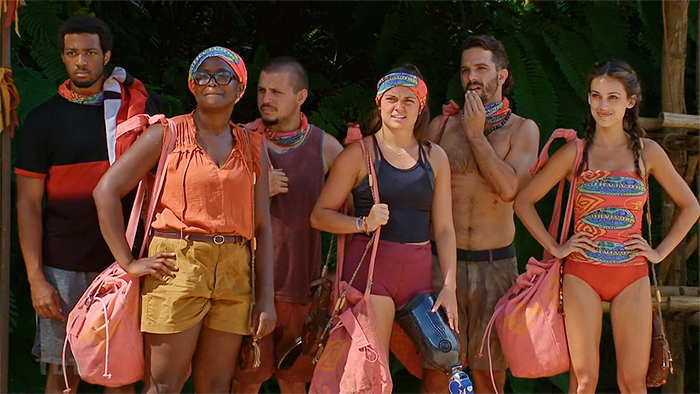
Where Vesi goes after the Ep2 vote is a mystery. From the episode title (Jesse's quote about signing "the divorce papers" with his island wife, Dwight), it sounds like that duo does not simply talk through their differences when they get back to camp. Dwight doesn't really have anywhere to go, since the Jesse/Cody/Nneka looks pretty tight, but Noelle's diagnosis (from the sit-out bench) that Nneka cost them the challenge doesn't seem that different from what the video showed. So it's not out of the question that if Vesi has to make a return trip to Tribal, they might target Nneka.
Dwight did some smart work with the puzzle, taking off his buff and using the logo on it as an answer key. But it wasn't enough. The tribe had a huge deficit in starting the puzzle, and the story of the challenge was Coco almost catching up to Baka, while Vesi dithered and dawdled. As a tribe, they've gone from first to second to third place in three straight challenges. Luckily for them, there's no fourth place (so far), so they can't continue getting worse!
The edit suggests Jesse is running things, as it was mostly at his urging that Cody recovered his vote. But it's also presenting Cody as both a huge, wildcard character, AND the guy who somehow gets things to go his way. A Jesse-Cody duo could dominate the game, but they both would benefit from not having to go to Tribal again until the merge.
Coco

This tribe, despite having six members still, somehow managed to only have three people give confessionals this episode: Karla, Ryan, and Geo. Lindsay and Cassidy have been almost completely purpled, despite Lindsay continuing to take on the hero/closer role in every challenge so far.
It's hard to know exactly where this tribe is headed, since we saw so little of them, but one particularly heavy-handed bit of editing foreshadowing took place during the Ep.1 segment where each tribe selected their representative for the dilemma ("risk rock") trip. James narrated Coco's number draw, then as Karla's boat departed, acknowledged that she was probably going to have an opportunity at an advantage, important because "advantages change things up. Someone that was nice and sweet ... can be a villain" [cue ominous bass drop as Karla smiles]. This, of course, fits with Karla asserting there's no line she won't cross in the teaser trailer for the season from the S42 finale. (Geo said much the same thing about himself this episode.)
So for everyone complaining that these people are all too nice: There's villainy ahead! Be patient! It's coming! (Probably.)
 Jeff
Pitman is the founder of the True Dork Times,
and probably should find better things to write about than
Survivor. So far he hasn't, though. He's also responsible
for the Survivometer, calendar, boxscores, and contestant
pages, so if you want to complain about those, do so in
the comments, or on twitter: @truedorktimes
Jeff
Pitman is the founder of the True Dork Times,
and probably should find better things to write about than
Survivor. So far he hasn't, though. He's also responsible
for the Survivometer, calendar, boxscores, and contestant
pages, so if you want to complain about those, do so in
the comments, or on twitter: @truedorktimes
ADVERTISEMENT